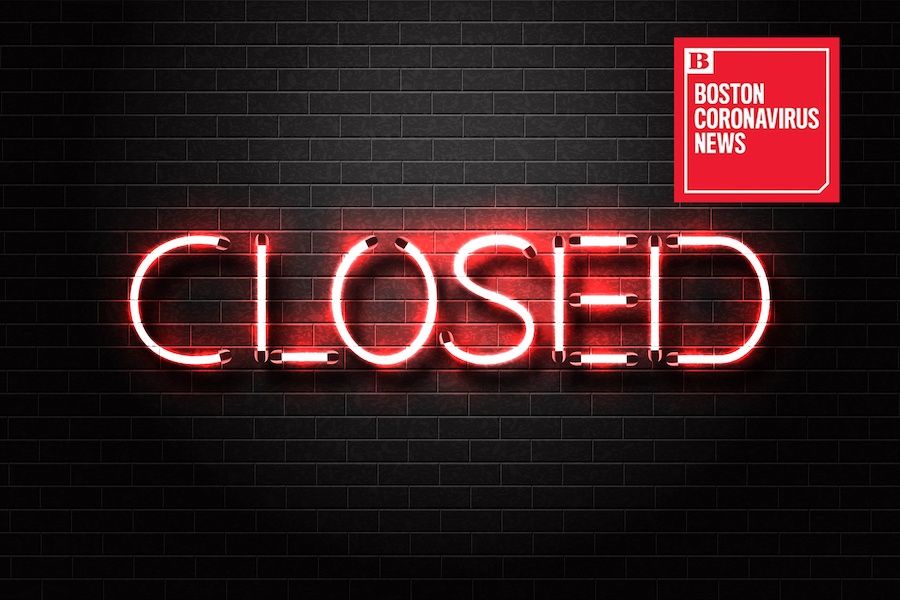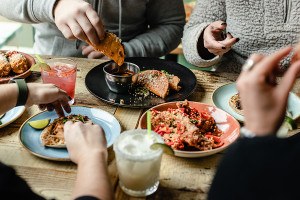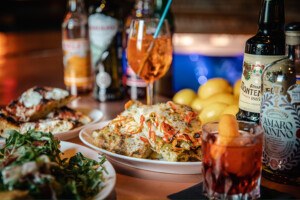Chefs React as All Massachusetts Restaurants Close Their Dining Rooms Due to Coronavirus
Governor Charlie Baker has banned on-site consumption until April 6, and emotions run from "destroyed" to "relieved."

Getty images
Over the last week, as more and more folks have employed social-distancing measures to halt the spread of the coronavirus pandemic, consumers have had to decide whether—and if so, how—to dine out at Boston-area restaurants. Restaurant owners, meanwhile, have been forced to decide between introducing significant new safety measures, or simply shutting their doors.
Now, the debate is over—officially. The verdict? It’s time to get comfy at your own kitchen table.
Beginning Tuesday, March 17, on-site consumption at all Massachusetts restaurants is prohibited, per an order by Governor Charlie Baker. The ban—which currently extends until April 6—was announced on Sunday night, and is part of a broader directive that limits gatherings to 25 or fewer people. That’s a dramatic reduction from the 250-person cap that Baker announced just days ago.
Baker’s ban on in-restaurant dining also superseded a less-stringent restriction announced by Mayor Marty Walsh only hours earlier on Sunday. Walsh would have only required Boston restaurants to cut their capacity by 50 percent. Under Baker’s new mandate, however, dining rooms are effectively closed—though restaurants may continue to offer takeout and delivery of food.
Nevertheless, many reeling business owners are concerned that—without additional federal or state support, anyway—the sudden, temporary shuttering could result in permanent restaurant closures down the line.
“I feel pretty destroyed,” says chef Chris Coombs, co-owner of Boston Urban Hospitality. Of course, he says, saving lives is paramount—and if these new measures to ban in-restaurant dining will accomplish that, so be it.
Still, Coombs can’t help but be gravely concerned about the future of his restaurants—Deuxave, dBar, and two Boston Chops steakhouses—which will close for the ban on Tuesday. (Going delivery-only just doesn’t make financial sense, Coombs says.) The chef is also worried for his staff: BUH employs over 230 people, he says, and they’re now without jobs. Although Coombs hopes to rehire as many as possible once the ban is lifted, he believes the ramifications of a coronavirus-stricken economy could affect the health of the restaurant industry, where margins are already notoriously thin, “for years to come.”
“Unless it’s a chain restaurant or a publicly held company, I don’t know that restaurants are going to be capitalized enough—or have the leverage—to reopen when the time comes,” Coombs says. For his part, he’s willing to sink “every dollar” available into keeping his businesses alive, even if that eventually means selling his home.
But it’s going to be a big challenge. Bills are a lot harder to pay with no revenue, and (re)opening a restaurant is expensive: For one thing, at any given time, Coombs’ properties have about $100,000 worth of perishable food on hand. On Monday night, he was making preparations to distribute those unused ingredients to members of his team; he knows that many of them live paycheck to paycheck. (In total, more than 350,000 people are employed by restaurants across the Commonwealth, according to the Massachusetts Restaurant Association.)
“I feel like I’m in a bad dream,” Coombs says.
Indeed, in the immediate aftermath of Baker’s ban, even the most established hospitality vets were trying to wrap their head around an unprecedented situation. “A metaphoric bomb has gone off, and in the days ahead, we’ll know better what it all means,” says chef Andy Husbands, who will have to temporarily close his three Smoke Shop barbecue locations, which employ about 250 people. He’s owned restaurants for 20 years now, and he says he’s never experienced anything like this.
It’s a tough pill to swallow, and not just for economic reasons. “Something I pride myself on, is that my restaurants are neighborhood living rooms,” Husbands says. “We supply more than just hospitality and food: We’re a shelter, a respite.” That said, the chef acknowledges that Baker’s restaurant restriction is “probably the right move” to curb the pandemic. “He looked at all the information, and made the move he believes is best for the state.”
And anyway, Husbands had already been wrestling every day with the logistics of trying to operate in seriously troubling times: Boston has been particularly hard-hit by the recent slump in restaurant business, according to figures from OpenTable, which has been tracking the decline in restaurant diners over the course of COVID-19. For instance, on March 14, the day before Baker announced the ban on in-restaurant service, dining-out in Boston was down 64-percent compared to 2019—tied only with NYC for the most significant downturn among all cities studied.
Husbands had still planned to keep “plugging along” at the restaurants for as long as he could manage—but now, he says, he accepts the “temporary finality” of a decision removed from his hands.
Actually, the state should have stepped in much sooner, says “relieved” chef Michael Scelfo. “I’ve been screaming at the top of my lungs, to anyone who’d listen, to get this industry closed down,” says Scelfo, who owns three popular Cambridge restaurants: Alden & Harlow, the Longfellow Bar, and Waypoint. In recent days, Scelfo has been vocal that city and state governments should institute mandatory, temporary closings to stem the spread of coronavirus, and consider bailouts to help businesses get back on their feet after a brief reset. He even earned the attention of Cambridge Mayor Sumbul Siddiqui, who showed “great empathy and understanding” in a phone call about the issue, Scelfo says.
Why advocate to close his own restaurants? Scelfo believes that before the statewide mandate, restaurants were placed in an “untenable” position: stay open during a public health crisis, or accept all liability by making a decision to close. He’s hopeful that, because the instruction to close came from the state, restaurants might access certain “avenues of relief” that wouldn’t otherwise be available. For instance, he says, some restaurants may be able to invoke business interruption clauses in contracts with insurance companies or landlords. Governor Baker has also indicated steps will be introduced to smooth the way for workers to file unemployment claims.
That’s just the beginning of what will be necessary to help hospitality folks through a crisis like this, says Kate Holowchik, pastry chef at Ledger Restaurant & Bar in Salem. Holowchik is a moderator of Industry United, a just-formed Facebook group where hospitality workers are sharing stories, concerns, and questions about navigating the industry amid COVID-19. Despite being a private group, Industry United has already racked up over 6,000 members in about one week. Holowchik hopes it will become a place where workers can organize and start the push for government aid, among other solutions. What form they take, no one is quite sure.
“We’re in uncharted territory,” Holowchik says.


